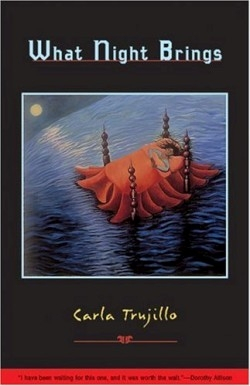What Night Brings
“I wished Raquel would like me instead (of a boy named Ruben). The problem was … she wanted a birdy. I had a cuca. She needed a car. I had a bike. She liked teenage guys. I was eleven.” The other problem is that the narrator, Marci Cruz, is a girl. Her other wish is for her father to disappear. Such is the life of this pre-teen Hispanic girl from a typical Latino family in 1960s small-town California.
Marci’s world is populated by members of her extended family, including her mother and younger sister, her abusive father, and numerous tias (aunts) and tios (uncles). One of her married uncles is having an affair with the parish priest. Far away in Gallup, New Mexico, is Marci’s last hope, her switchblade-carrying, shotgun-toting grandmother who owns a bar. Conversations are carried on in Spanglish, a mixture of English and Spanish, as well as a mixture of rough cursing and a Catholic religious fervor.
What night brings every day at five o’clock is her abusive father, home from work, who likes taking off his belt and hitting his two children across the mouth with it, or slamming them against the wall—all in the name of having them show him the respect he thinks he deserves. Every morning, Marci checks to see if Baby Jesus, Mother Mary, or God Himself has granted her wish to make her a boy, by taking away her cuca and replacing it with a birdy. What Marci doesn’t understand until much later in the story is that she’s a lesbian. Once she figures that out, her desire to become a boy goes away. Every day, she also tries to discover a way to get rid of her father.
The author is the winner of the 2003 Mármol Prize for this first novel, as well as the winner of the Lambda Literary Award and the Out/Write Vanguard Award. She is editor of both Chicana Lesbians: The Girls Our Mothers Warned Us About and Living Chicana Theory. Here she tells, in the inimitable language of an eleven-year-old girl, a story of heart-stopping horror at the vulnerability of children at the hands of abusive adults, of the confusing world of sexual attraction, and of the humor of a strong-willed child bound to remake her surroundings into a more sensible and gentle place.
This novel is a natural for Chicana/Chicano literature studies, as well as a great contribution to Hispanic-American culture.
Disclosure: This article is not an endorsement, but a review. The publisher of this book provided free copies of the book to have their book reviewed by a professional reviewer. No fee was paid by the publisher for this review. Foreword Reviews only recommends books that we love. Foreword Magazine, Inc. is disclosing this in accordance with the Federal Trade Commission’s 16 CFR, Part 255.

